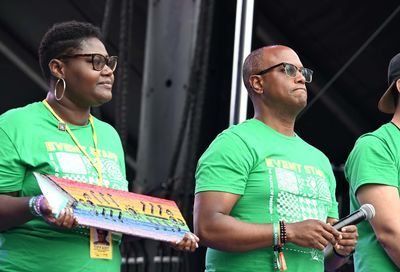For the Record
Learning Curve
The battle over same-sex marriage in the courts — public courts, religious courts, the court of public opinion — recently led me into a long discussion with my girlfriend. I find attacks on the idea of gay marriage painful, as they so often devolve into attacks on gay love and sex in general, with insistence that man-plus-woman is the sole Godly path. I’m comfortable asserting that Godliness may be found in same-sex partnerships, and I sympathize deeply with couples who’d like to see their own commitment validated in a legal ceremony — one just as binding and celebratory as the weddings of straight folks.
I know that most gay couples, like most heterosexual couples, aren’t just in it for the toaster and matching china — they genuinely wish to herald the joining of two lives. But too many of us, politely attending the “real” weddings of siblings and friends, have endured a wedding sermon that goes something like this: “And let us now praise Bud and Jan, who instead of taking the easy way out and selfishly living together [in sin] have chosen to honor God and their parents by doing the right thing.”
We grind our teeth and then go home to sip Maalox, knowing that we have no such option to upgrade our domestic arrangements into marriage even if we wish. The mainstream life stages of wedding day, cards of congratulation on your commitment, and all those anniversary dates aren’t meant for us.
I learned this lesson early on as a fourteen-year-old baby dyke, trying to ice-skate at the Cabin John rink holding my best friend’s hand during “couples only” time. We were asked to leave the ice. That’s how many people feel about gay love: not only does it not count, but it shouldn’t be seen. And that, after all, is what legalizing gay weddings is about: public affirmation.
But what are my own views about marriage as a rite? Schooled in radical feminism, I spent my twenties reading manifesta after manifesta condemning marriage as oppressive to women. Marriage made distinctions between those known as Mrs. and those known as Miss, yet all the while men were forced to relinquish their family name or reveal their marital status by being addressed as Mr.
Good old Ms. magazine began from this very concept: the sheer radicalism of using a term like Ms., thereby not defining women by their marital status. (Here’s a bit of fun trivia: In Spanish-speaking feminist circles, a similar blow was struck to the use of titles Senora/Senorita through the introduction of the title Sa., pronounced “Sena.”) These innovations irritated everyone from the New York Times, which refused to use Ms. until very late in the game, to All in the Family‘s Archie Bunker, who in one famous episode screamed “Ms., Ms.! It sounds like a bug!”
Meanwhile, the national divorce rate skyrocketed and celebrity marriages flickered, then went out. The economic empowerment of women and greater education about domestic violence led quite a few wives to abandon abusive husbands. Some of these wives found solace and a new love in the arms of other women, resulting in new definitions of “family” and the now-familiar custody battles for lesbian moms.
Cynics declare that marriage is simply about property, ownership, inheritance. In hipper cities and businesses, domestic partnership laws allow for quasi-marital benefits and the right to visit one’s partner in a medical institution. Groups such as Rainbow Law are able to advise gay couples on power of attorney actions and wills. Tax laws may or may not give married couples a break. Ultimately, today’s battle is really about the symbolic right to be married in the eyes of the law, not just in one’s own proud and loving estimation. It’s the echo that comes back from the ceremonial grotto where we shout our love — the echo that rings back “Yes, agreed, the two of you are one.”
And I can hear that echo in my dreams, that hope of being seen and written into the record.
Bonnie Morris can be reached at bmorris@metroweekly.com.
Support Metro Weekly’s Journalism
These are challenging times for news organizations. And yet it’s crucial we stay active and provide vital resources and information to both our local readers and the world. So won’t you please take a moment and consider supporting Metro Weekly with a membership? For as little as $5 a month, you can help ensure Metro Weekly magazine and MetroWeekly.com remain free, viable resources as we provide the best, most diverse, culturally-resonant LGBTQ coverage in both the D.C. region and around the world. Memberships come with exclusive perks and discounts, your own personal digital delivery of each week’s magazine (and an archive), access to our Member's Lounge when it launches this fall, and exclusive members-only items like Metro Weekly Membership Mugs and Tote Bags! Check out all our membership levels here and please join us today!

























